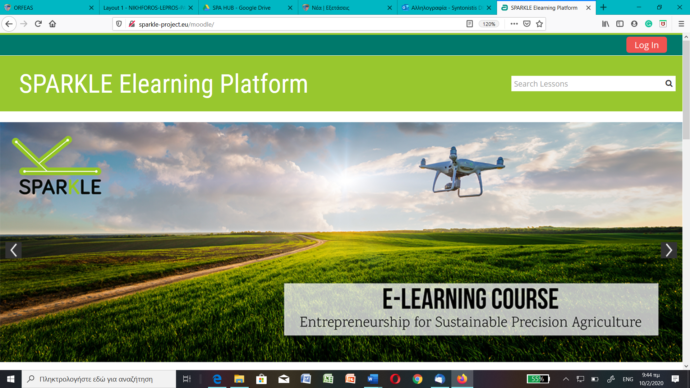One of the most important results of the ERASMUS+ Knowledge Alliance Project SPARKLE (588241-EPP-1-2017-1-IT-EPPKA2-KA) is the creation of an e-learning platform (http://sparkle-project.eu/moodle/) including a course “Entrepreneurship for Sustainable Precision Agriculture” for academics, university students and agri-entrepreneurs. The course intends to present a general overview of sustainable precision agriculture and teach how to build an entrepreneurial mindset. The course students will explore a range of precision agriculture technologies with specific insights on geomatics, sensors, data mining, robotics, machine learnings etc. for farming and innovation while taking into account the environmental, social and business issues.
The course includes four general areas (Sustainable Precision Agriculture Overview, Technology, Social and Economic Aspects and Entrepreneurship in Farming) and twelve lessons in total (Introduction to SPA, Variable and Systems, Positioning Systems, Proximal Sensing, Variable Rate Technology, Data Analysis, Communications, Policy and Management, Entrepreneurship in SPA and a Toolkit for Agripreuners 4.0). The course is divided in online lessons (≥13 hours), face to face lessons (≥8 hours) and “on field” activities (≥4 hours) covering a total of more than 25 working hours.
At the end of the course the students will be invited to put into practice the knowledge and skills developed, taking part in a business model competition by a real farm to face with. The winning student’s group, for the first edition of the course, will be awarded implementing the new business model working side-by-side with the farmers presenting it.
The course is designed to cover a multitude of technical and social, economic or environmental aspects and is therefore a holistic approach to precision farming and related entrepreneurship. It is undoubtedly an innovative and important endeavor that is not easy to find in conventional university curricula and is thus considered an important opportunity for both academics and university students. Besides, the course material and architecture were designed on the basis of a primary research, conducted by a large number of European university students, looking for gaps in the relevant University curricula and exploring students’ interests and concerns. Ιt will be a great success if the course can be integrated into some University curricula and thus maintain its sustainability and continuous improvement through the planned evaluation process.

